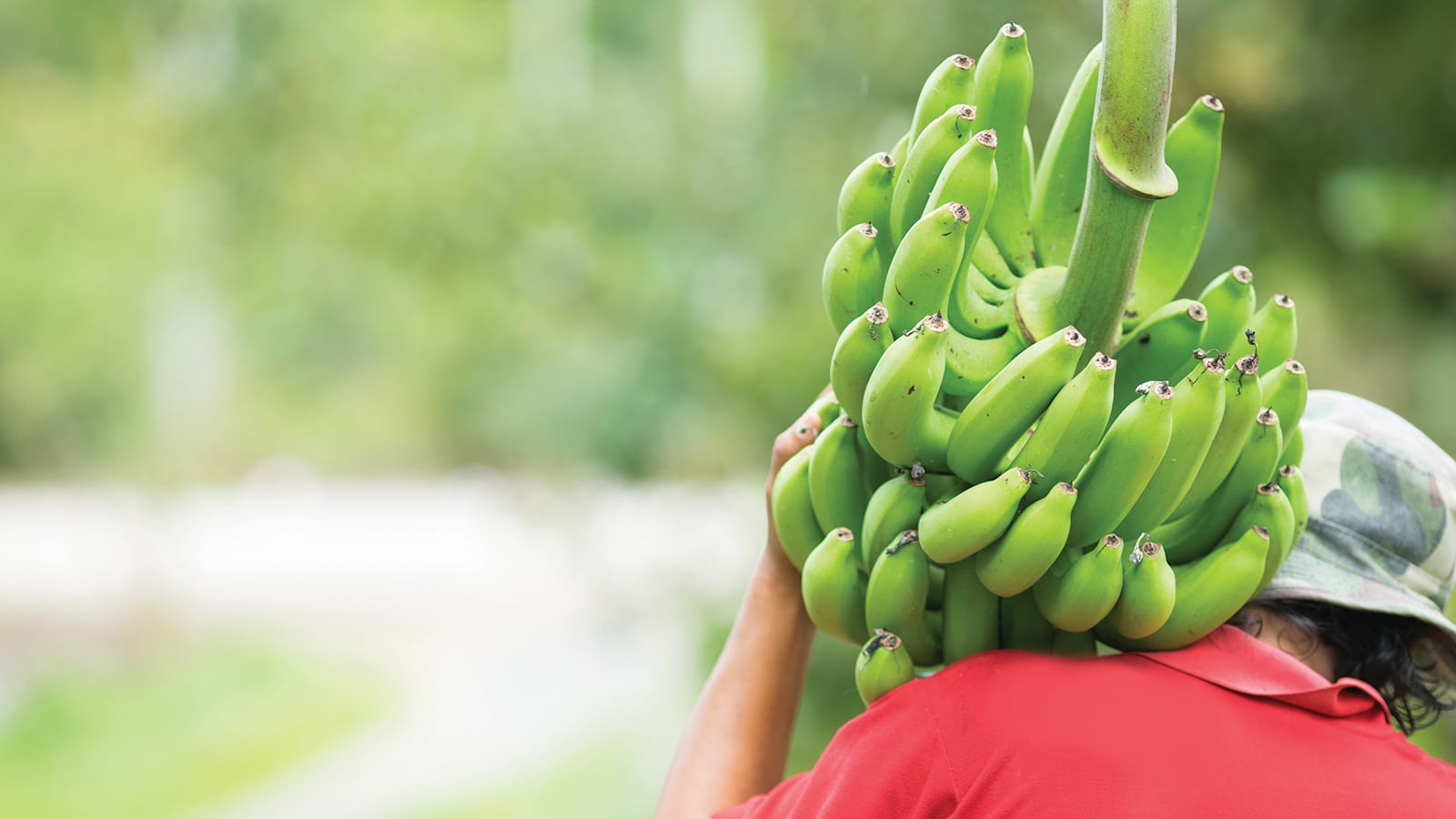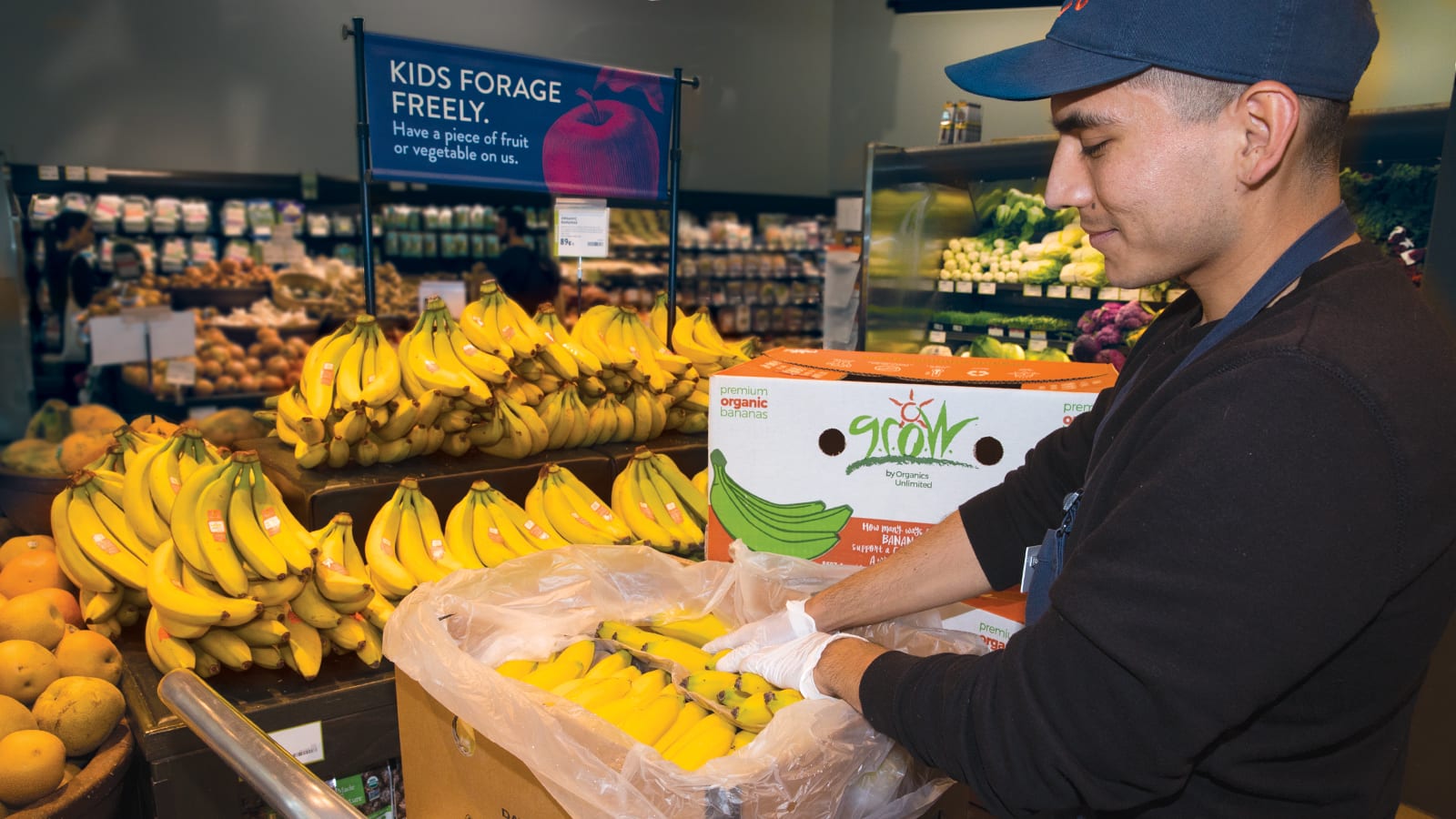Grow Bananas: increase your impact
by Cynthia Lair
This article was originally published in October 2018

Americans consume around 28 pounds of bananas per person every year. With this much consumption, it is worth knowing where and how the fruit is grown. The answers for PCC shoppers are spelled out on the colorful sticker of each bunch.
Before peeling off the sticker when you get your hand home, read it. Note the reassuring words Organics Unlimited, Sustainability and GROW. Alongside the nutritional benefits, the story behind the sticker may engender as much delight as eating the banana itself.
Organics Unlimited
The Velazquez de León family has been growing and selling organic bananas since 1974, before “organic” was well known. They followed strict organic practices from the get-go and were the first to sell 100 percent organically grown bananas.
In 2000, as their business expanded, they created the Organics Unlimited brand — noted in tiny letters under the word GROW on the sticker. Their bananas are imported year-round to the United States, Canada and Japan, primarily from Mexico (where the family business began) and Ecuador. The “unlimited” part of the name is fitting as their practices go far beyond not using pesticides on banana trees.
Their dedication to organic standards and use of the word “sustainability” on the sticker extends to protecting the health of the people involved in growing bananas, as well as the environment where they are grown. Care is taken to use water efficiently on their crops, depending on local rivers and wells dug on each plantation rather than artificial irrigation. Composting the stalks and leaves left after harvesting, along with a robust recycling program at every farm, also add credence to the use of the word “sustainability” on the sticker. The health and safety of workers is upheld by avoiding the use of toxic chemicals on the crops, but reaches deeper into supporting the local community through their GROW program (described below).
Nutritional benefits
Producing a food choice that sustains health is an important part of the Organics Unlimited mission. Eating one finger from your banana hand will throw down a mere 110 highly useful calories. With around 400 milligrams of potassium per fruit, bananas can be considered heart healthy as potassium plays a part in normalizing blood pressure and maintaining heart function.
Even though bananas are sweet, they are given a low glycemic index value. This is mostly due to the three grams of fiber included in each banana. Pectin, part of the total fiber, slows the conversion of the banana’s carbohydrates into blood sugar. Equally impressive, the banana fiber includes fructooligosaccharides (FOS), a long word with big benefits. The friendly bacteria in our gut count on FOS and other fibers as a food source, aiding their health and proliferation.
Containing 75 percent water, this fruit also can be counted as an excellent hydrator.
Unlike most bananas that typically withstand a month of shipping, Organics Unlimited bananas are delivered within four days of harvest. That’s an additional reason these bananas just plain taste better than others.
Hydrate, lower your blood pressure, take in some pre-biotics, and satisfy your sweet tooth in a sensible way, all in one cheerful, yellow food.

Giving Resources and Opportunities to Workers (GROW)
It’s the word GROW on the label that really deserves the spotlight. GROW stands for Giving Resources and Opportunities to Workers.
The GROW part of the company, started in 2005, focuses on giving back to the communities where the bananas are grown. A small surcharge is added to each 38-pound box of GROW bananas and markets may choose to pay it or not.
PCC chooses to participate and provides ongoing support to the GROW program. The money from GROW products goes to the International Community Foundation that vets reliable applicants and divvies up the funds appropriately.
One major recipient of GROW dollars is Project Amigo, where funding is used to support youth education in the producer communities in Mexico and Ecuador by shoring up access to early childhood education and subsidizing university student housing. Other targets for the money include assistance with dental and vision care for local people and securing access to clean water. In 2015, the GROW arm of the company also set up disaster relief as part of their giving program.
Under the word GROW and Organics Unlimited, a full sentence on the sticker says, “Sustainability is the fruit of healthy communities.” A few words with big implications.
Organics Unlimited and PCC’s commitment to support its GROW program reflects respect for the whole cycle of bananas. Each step in the journey is considered: from the soil and water used to grow the bananas, the people who live in the banana-growing communities, and the consumer’s well-being.
If you find yourself unconsciously discarding the label on your banana hand, hold it up. Take a look, and bring to mind the good intentions that the sticker reflects.
Cynthia Lair is the author of the popular cookbook, “Feeding the Whole Family,” as well as “Feeding the Young Athlete,” and an upcoming book on sourdough breads. She founded the B.S. in Nutrition and Culinary Arts program at Bastyr University where she is an adjunct professor.
Stickers don’t compost
Labels on bananas and other produce are not compostable and must be discarded in garbage. Please remove and put your produce labels in the trash so they don’t foul the composting process.
Caramelized Bananas Recipe
Makes 4 small servings
2 tablespoons unsalted butter, divided
2 tablespoons unrefined cane sugar or brown sugar
2 tablespoons mirin or rum
1 teaspoon vanilla extract
1⁄8 teaspoon ground nutmeg
2 medium ripe bananas, cut lengthwise
Preheat the oven to broil and lightly grease a baking dish with ½ teaspoon of the butter.
In a small saucepan over low heat, heat the remaining butter, sugar, mirin, vanilla and nutmeg until butter has melted. Stir to combine.
Place the banana halves in the prepared baking dish, cut side down. Pour the sauce over the bananas and broil them until the sugar bubbles and the bananas are lightly browned, about 5 minutes.
Recipe reprinted with permission from “Feeding the Whole Family,” 4th edition by Cynthia Lair (Sasquatch Books, 2016)
